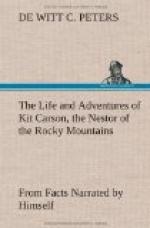In obeying this command, the soldiers had not more than wheeled about, when down came the foe in full pursuit, making the very air ring with their war-whoops and unearthly shouts. So bold did these Indians become from the victory which they had achieved, that they charged so hotly and so near the soldiers that the latter were compelled, in self-defence, to turn and, in a hand to hand contest, beat them off. After resisting a succession of these assaults, the command finally gained the main road. Upon counting his men, Lieutenant Davidson found that twenty of them were killed and left behind on the battle-field; and that, out of the surviving forty, hardly one man had escaped being wounded, thereby showing, considering the numbers engaged, how bravely the fight had been maintained, and how gallantly each one had endeavored to turn the tide of affairs to a more favorable result.
The course pursued by, and even the bravery of, Lieutenant Davidson in this affair, has been unjustly assailed and questioned by some persons who have probably been misinformed on the subject. Judging from the evidence of his companions, there was not a more courageous man on that ground than the officer in command. Kit Carson refutes the accusation made against his friend in the following strain: “I am intimately acquainted with Lieutenant Davidson and have been in engagements with him where he has taken a prominent part and can testify that he is as brave and discreet as it is possible for a man to be. Nearly every person engaged in and who survived that day’s bloody battle has since told me that his commanding officer never once sought shelter, but stood manfully exposed to the aim of the Indians, encouraging his men and apparently entirely unmindful of his own life. It was, however, in the retreat they say that he acted the most gallantly, for, when everything was going badly with the soldiers, he was as cool and collected as if under the guns of his fort. The only anxiety he exhibited was for the safety of his remaining men.”
The Indians must have lost many of their warriors in this fight, but the exact number has never been ascertained. The news of the defeat was brought by the retreating soldiers themselves to the town of Taos, where on hearing it, for short time, consternation seized hold of its inhabitants; but slowly they calmed down, and a party, consisting of Americans and Mexicans with wagons, was sent out to bring in the mutilated remains of the fallen. On reaching the field, the dead were found, but they were all mutilated and stripped of all their clothing. The Indians had left nothing which they thought might be turned to the least account. One poor fellow had escaped the rigid scrutiny of the red men by crawling to an obscure place where he had died from his wounds. On his body was found a belt that contained three hundred dollars in gold—his hard earnings that he had been saving up against a day of need. Had the savages known of this money, they would not have




